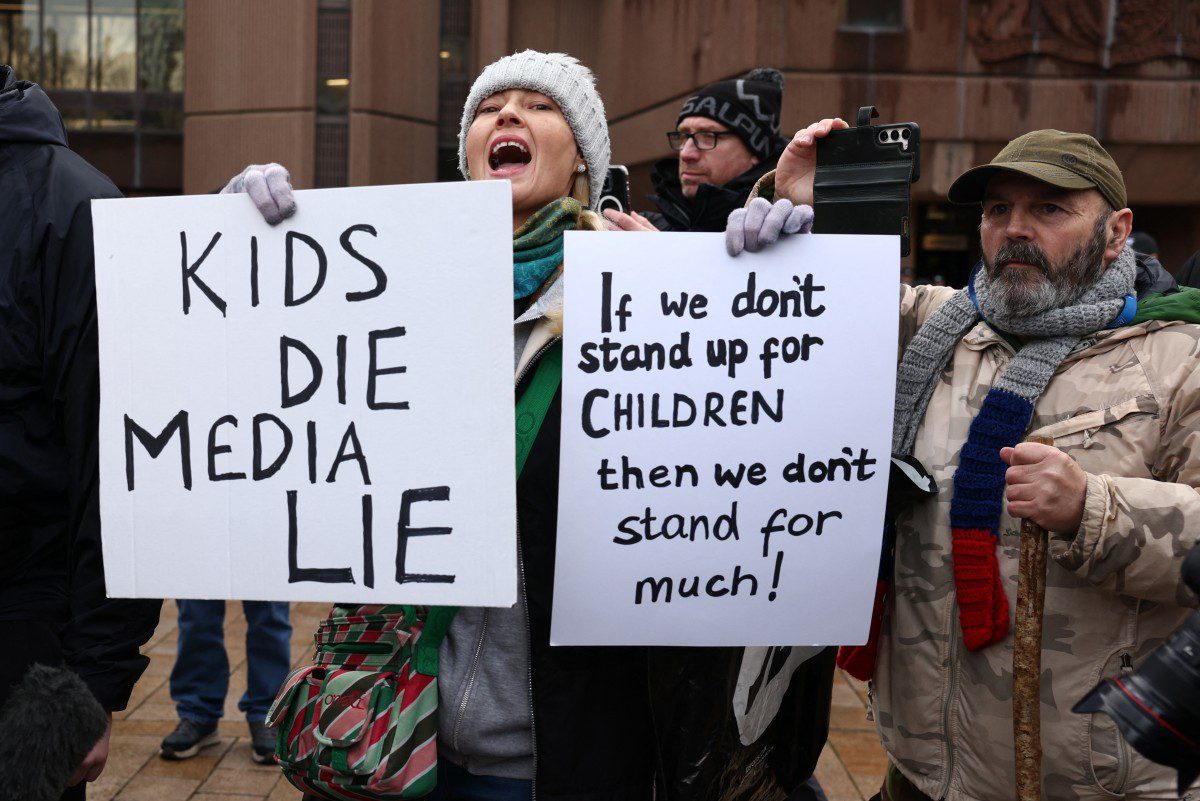
Protestors hold placards as they demonstrate in front of members of the media on January 23, 2025, ahead of the sentencing Southport attacker Axel Rudakubana.
Darren Staples / AFP
Child killer Axel Rudakubana has been sentenced to 52 years behind bars—less than three times the combined age of the three girls he murdered. Typically, this means he will be freed from prison at the age of 70, if he is still alive, and if the parole board allows it.
Ahead of sentencing, the parent of one victim said “Axel should rot in jail” until dead. Their child was left needing surgery after the attack.
Under UK law, a whole life order can only be imposed on criminals aged 21 and above, though it can also be considered as a punishment in exceptional circumstances for those aged 18 to 20. Rudakubana was less than a fortnight away from his 18th birthday when he carried out his attack.
The parent, who cannot be named for legal reasons, told The Sun that should imprisoning the killer for life mean “the law needs changing, so be it.”
Patrick Hurley, the Labour MP for Southport, has also called for legislation to be updated so that criminals such as this can be given a whole life order.
Judge Goose handed out concurrent sentences for all the offences, meaning they will all be served at the same time. Discounts were also given because of Rudakubana’s age and the fact he pleaded guilty on the first day of his trial. The 175 days he has already spent on remand have been deducted from his sentence, meaning he will actually spend a minimum 51 years and 190 days in prison. The judge said “it is highly likely that he will never be released,” adding that had Rudakubana been 18 at the time of the attack, he
would have been impelled to impose a whole life term meaning he would never be released … However, the law does not permit such a sentence for those under 18 at the time that they committed the offence.
Goose also noted that after the murderer’s time is served, “it will be for the board to decide if he is ever safe to be released into the community. And if ever he is, he will remain on licence for the rest of his life, subject to recall into custody if he breaches his licence terms.”
Liverpool Crown Court heard today that Rudakubana said while in custody after the dance class attack last summer:
It’s a good thing those children are dead, I’m so glad, I’m so happy … So happy, 6 years old. It’s a good thing they are dead, yeah.
He pled guilty earlier this week to murdering Alice da Silva Aguiar, nine, Bebe King, six, and Elsie Dot Stancombe, seven, as well as to attempting to murder 10 others and to the production of ricin, a biological toxin, and to the possession of materials relating to the al-Qaeda Islamist terror group.
Family members were in tears today, in what is thought to have been the first time they were in the same room as Rudakubana since the attack, as graphic details of the events were read out—some “so horrendous,” they cannot be reported.
It was revealed that Rudakubana stabbed one of his victims, aged just six, at least 122 times.
Footage shown to the court also included the moment another girl who tried to escape from the scene was dragged back inside. When her father found her, the injuries were so severe that—as the mother put it in her witness statement—“daddy couldn’t recognise her.” The girl has been left physically—not to mention mentally—scarred for life.
The prosecution said that Heidi Liddle, a teacher at the dance studio, was helping children make bracelets when she saw Rudakubana—who the adults in the room presumed was collecting a student—“lunging,” and only “began to register what was happening” when she saw fellow teacher Leanne Lucas being stabbed. After ushering children out of the room, Liddle followed a girl into the toilet, “locked the door and braced her foot against it.”
She told [the girl] to remain very quiet, not to make a sound. Outside, they could hear children screaming, and then the door rattled. When she heard voices outside the door crying for the defendant to stop she realised that not all of the children had managed to escape.
Lucas read her own statement in court today, saying: “As a 36-year-old woman I cannot give myself compassion or accept praise, as how can I live knowing I survived when children died.” She feels as though she cannot look after children again.
A 14-year-old victim who was “determined to speak” also gave evidence remotely.
The fear I had not knowing where my sister was and screaming her name, I couldn’t see her. I didn’t know if she had got out. I will never forget that blind panic.
She and her sister still have nightmares. Her father has had to close his business because he has “not been able to cope mentally.”
The girl said she had felt “lonely” since the attack because her classmates didn’t know what to say to her, adding:
I have to have a special chair in school, because the usual chairs dig into my scars.
Despite remaining silent during most of his previous court appearances, the murderer today repeatedly disrupted proceedings—shouting that he needed to speak to a paramedic because he felt ill—and was eventually ordered by Judge Goose to leave the dock. A man in the public gallery shouted “coward” as he walked out.
Public discourse on the Southport attack, and the state’s censorship of important details surrounding the case, is still far from resolved. Reform UK leader Nigel Farage yesterday said that the government’s counterterrorist Prevent programme—to which Rudakubana was referred three times before last summer—“is not fit for purpose.”
